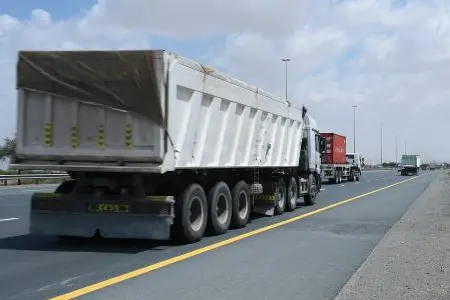PHOTO
- Trucks prohibited movement timing revised during Ramadan
Roads and Transport Authority – Abdul Fattah Haidrah:
Dubai’s Roads and Transport Authority (RTA) cautioned motorists against the risks of driving when exhausted or feeling sleepy, especially during the holy month of Ramadan where many motorists may lose concentration due to the change in eating and sleeping habits.
RTA is teaming up with the Ministry of Interior in running ‘Accidents-Free’ Ramadan campaign under the traffic safety strategy of Dubai. The campaign aims to create awareness amongst motorists about the risks of driving when feeling exhausted or sleepy.
RTA is also commmunicating awareness messages through social media channels and placing educative ads at key bridges on Sheikh Zayed Road. About 300 thousand text messages were sent to motorists urging them to driving safely during Ramadan. Leaflets and Ramadan gifts are being distributed at customer service centres in cooperation with Emirates Driving Institute, Al Mutakamela Vehicle Testing and Registration Company, and Listerine.
Iftar meals together with awareness leaflets are being distributed to drivers of heavy trucks at rest stops on highways in collaboration with Middle East Specialized Cables Company (MESC).
Trucks movement time on Dubai’s roads during Ramadan has been amended. The prohibited trucks movement time during the morning period is from 07:30 am to 09:30 am (instead of from 06:30 am to 08:30 am during normal). On E11, the prohibited timing is from 07: 00 am to 11:00 pm (instead of 06:00 am to 10:00 pm). Trucks prohibited movement timing on the rest of the day remains unchanged.
The variations of sleep patterns and office timings during Ramadan tend to influence the concentration of fasting motorists; which is visible in the hectic rush from the office to home at a time where drivers concentration drops to the minimum. It impacts the ability of the driver to take an appropriate decision at the right time. Therefore, extra caution and attention is required when driving from the workplace to home to avoid traffic accidents.
Most accidents that take place in Ramadan are attributed to the lack of leaving safe distance between vehicles. Drivers are advised to switch on air-conditioners while driving as heat conditions give rise to the feeling of exhaustion. The driver has to maintain an upright position while seated and keep the head raised while driving.
Drivers are recommended to take a sufficient amount of rest before sitting behind the wheel and cease driving once they feel very tired, drowsy or yawning. Resting for a short period may help the driver to complete the journey safely. Once drivers hear the call for Maghreb prayer while driving, it is advisable for them to stop for a light Iftar, even if it includes a glass of water and few dates, before resuming the journey.
-Ends-
© Press Release 2019Disclaimer: The contents of this press release was provided from an external third party provider. This website is not responsible for, and does not control, such external content. This content is provided on an “as is” and “as available” basis and has not been edited in any way. Neither this website nor our affiliates guarantee the accuracy of or endorse the views or opinions expressed in this press release.
The press release is provided for informational purposes only. The content does not provide tax, legal or investment advice or opinion regarding the suitability, value or profitability of any particular security, portfolio or investment strategy. Neither this website nor our affiliates shall be liable for any errors or inaccuracies in the content, or for any actions taken by you in reliance thereon. You expressly agree that your use of the information within this article is at your sole risk.
To the fullest extent permitted by applicable law, this website, its parent company, its subsidiaries, its affiliates and the respective shareholders, directors, officers, employees, agents, advertisers, content providers and licensors will not be liable (jointly or severally) to you for any direct, indirect, consequential, special, incidental, punitive or exemplary damages, including without limitation, lost profits, lost savings and lost revenues, whether in negligence, tort, contract or any other theory of liability, even if the parties have been advised of the possibility or could have foreseen any such damages.




















